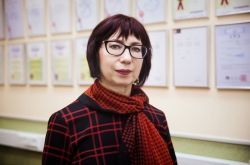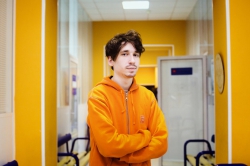Ivan Iorsh, PhD, head of a megagrant research project, on making a career in science
A scientist’s career is not that different from any other
A successful scientific career does not necessarily result from a great scientific discovery. You can make a huge breakthrough that will launch a successful career, but the history of science is abound with examples of scientists who made important discoveries but did not see much success. For all great discoveries, apart from demanding hard work and talent, are largely accidental. In a sense, you can be considered an accomplished scientist if you head major scientific projects and hold a permanent professorial position in a foreign or Russian university. Nevertheless, a scientific career has its own unique traits.
The first one is the high level of competition. On average, in the course of their work one professor will mentor about 15 PhD students, meaning that the number of PhD students grows extremely fast while the number of available professorships grows very slowly, and so the competition for the professorships intensifies. In a report on careers in science, Britain’s leading scientific society, the Royal Society of London, shows the main stages of a scientific career, indicating during which stages the weeding-out of specialists occurs. The report finds that this process starts in the doctoral school, as only half of all students pass their thesis defense. Half of those who pass find work in the industry, and around 30 % of the rest take up temporary scientific posts; even then, some of them leave for the industry anyway. In the end, only less than 1 % of those who enrol in PhD programs become professors: there is one professor per every 200 PhD students.

The second is that the scientific sector is one of the most internationalized in the world. The rules of the game for scientists are more or less the same in the majority of countries: there is this never-ending contest for positions, funding, and regalia. Publication rates tend to be the universal criterion of success. There is, however, an alternative to the numerical ratings – scientists’ reputations. Thirty or forty years ago the scientific community was significantly smaller and one’s reputation played a huge role. Now, the reputation factor is losing importance as the scientific community becomes more and more global, and the funding is distributed by government officials who usually have little understanding of scientific projects. For this reason, government officials need a formal, numerical rating to guide them in their choice. In Russia, the reputation factor lost in its significance because of many scientists leaving the country in the 90's, which lead to the disruption of intergenerational continuity in science. In some places, though, reputation remains one of the most influential factors: in top American universities, for example, a post can be obtained thanks not only to a scientist’s existing publications, but also through personal referrals. Nevertheless, in general the success of a scientist is determined by his or her publications in respectable scientific journals.

The defining feature of the scientific career in Russia is how easy it is to obtain a permanent professorship that does not, however, guarantee material success. While professorships in the West come with a comfortable income in tow, in Russia you can become a professor at the age of just 30, but earn very little money. That explains why Russian scientists tend to mainly live off grants.
When to start and how to choose a country
It is generally considered that a scientific career formally starts with entering a Master’s program. Having publications by the fifth year of your studies is good. Starting to publish your work in the second year is even better. Career-wise, the country in which you carry out your work doesn’t really matter – what matters is your research group and scientific adviser. That is why before embarking on a scientific project it is better to check what the research group has been doing, where it is published and what it has achieved.
Stay or go
A scientist is usually seen as someone inextricably connected to his or her location, but in truth a scientist, if he or she has a more or less established scientific career, is highly likely to change locations regularly. Delocalization is one of the conditions of the scientific career.
Alexey Slobozhanyuk, PhD, on returning to Russia

I did my Bachelor’s and Master’s degrees at ITMO University and then went on to do my postgraduate studies at the Australian National University. I felt that I received something and wanted to give something back. I returned to a world-class research centre, which today’s Faculty of Physics at ITMO undoubtedly is. What’s more, ITMO University itself is now considered one of the best Russian universities and ranks among the top 10 universities in the country. I was also attracted to the prospect of developing cutting-edge information technologies in Russia, as here this part of the market is a completely unchartered territory. Besides, working at the Faculty of Physics of ITMO University is like hanging out with a group of friends. I was returning here knowing that I have colleagues whom I can call friends, and this is very important.
Some people take up employment just for the income it provides; they do not like their job, they just want the money and they live for it. Warren Buffett once said that taking jobs you don't like because it will look good on your resumes is like saving up sex for your old age. In other words, these people put their whole lives and all the exciting things that should happen to them on hold, and that is just sad. I feel that ITMO University offers me unlimited opportunities for personal growth; there is nothing that will hold you back from getting as much knowledge and skills as possible, there are lots of specialists coming here from all over the world on a regular basis, and there are no bars set in terms of your income: just earn grants, launch start-ups, work.
Alexandra Kalashnikova, PhD, Laureate of the President of the Russian Federation Science and Innovations Prize, - on working at The Ioffe Institute, women in science, and moving countries

In 2013 my research group and I, jointly with a leading scientist from Switzerland, won a megagrant (a large research grant awarded by Ministry of Education and Science). We used the funding to create an entire laboratory for ferroics research, where we conduct top-level research in the sphere of magnetic recording. Our laboratory is different from what you might expect, having this grand Academy of Sciences image in your head. It is a small laboratory, and the people who work there are all less than 40 years old. In total, we have three research associates, four PhD students, four students and a lot of scientific tasks on hand.
What’s special about working at the Academy of Sciences is that we keep to the tradition that has always been there: the feeling and the reality of academic freedom which manifests itself in the independence of research groups. We are self-reliant; each member of the staff is autonomous. If you want to be a PhD student at the Academy of Sciences, you have to be a courageous person who is ready to solve difficult scientific problems whilst being very independent. This is a defining feature of our institution that we want to uphold. Old academies and institutions were once upon a time created by young people in the beginning of their careers: at first they formed small laboratories which then turned into big institutions. In that sense, I think that our laboratory is now reliving this journey.

On gender balance in science abroad and in Russia
There is a widespread belief that there are a lot more women engaged in science abroad than in Russia. I would disagree: the situation differs from country to country. In the Netherlands, for instance, this is indeed an issue, because due to some historical, social, and economic reasons there is an extremely low share of women in science. Meanwhile, in France, the gender ratio is radically different. In many countries today there is a lot of talk about getting more women into science. It seems to me that there is a risk of carrying things to the extreme; this positive discrimination can actually be harmful to women because it may create a certain negative image of women getting into senior positions just because of their gender. That is why we have to be careful with such policies, which are now being considered in Russia, too. That said, we have to motivate our wonderful young women to choose a scientific path by giving them a positive example, and this has to be done as early as during their school years. This way, we will come to a right balance over time.
On moving countries
This isn’t exclusive to Russia: the question of whether to leave or not is relevant for scientists from many other countries. The thing is, in many countries there is a perception that if you are building your scientific career exclusively in the country where you have received your education, you are not likely to be regarded as an accomplished scientist. In the majority of countries it is assumed that a scientist has to go to a different country, work in an international team, and adopt the best practices that exist there; after all, even the culture of communicating within a group changes from country to country. In this sense, the debate on where it is best to work has an international context. I can only say that gaining the experience of working in other countries, be it short-term or long-term, is an absolute must. Speaking from my example, the experience of working abroad, in the Netherlands, had given me access to the latest equipment, which meant that after returning to Russia and receiving an opportunity to purchase this equipment, I had no difficulty using it.
Andrey Bogdanov, PhD, on a strong theoretical school of thought and research performance indicators of PhD students from Russia

Why Russia has a strong theoretical school of thought
For a country to have a strong engineering school of thought there has to be a demand from the industry. In turn, there can be no well-developed engineering school of thought without a strong experimental physics school of thought. When Russia was going through hard times, much harder than it is now, and people just wanted to survive, there was no chance for an experimental school of thought to develop. Our strong theoretical school of thought has subsisted because if you lock a bunch of theorists in a room and give them a sheet of paper, a pen, and some food, theorists will maintain and advance the knowledge and experience that they have. Experimentalists, however, cannot go much further without equipment, and that is why in many parts of the country engineering schools are just beginning to be reestablished.
Research performance indicators of PhD students in Russia and abroad
Our PhD students often go abroad in order to work in the laboratories that we have links with. When I talk with the PhD students who work abroad, they often tell me that the places they work in lack movement and drive, that the working process is too slow. The fact is, conducting high-level research in Russia means working more intensely, but when you have a helpful working environment, it motivates you to go further; that is why the research performance indicators of the PhD students who pass their thesis defense in Russia and then go on working abroad are much higher than those of their foreign colleagues. I remember a case when a PhD student of one of my colleagues applied for a position in a joint project with Germany and the Germans, having gauged the quality and quantity of this student’s publications, mistook him for a professor.





